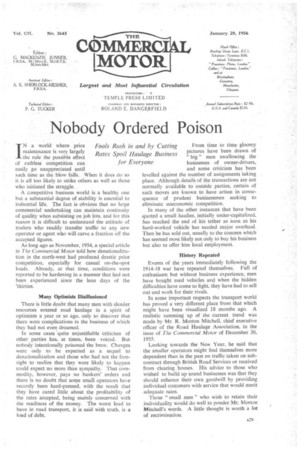Nobody . Ordered Poison T N a world where price maintenance is
Page 31

If you've noticed an error in this article please click here to report it so we can fix it.
very largely the rule the possible effect of ruthless competition can easily go unappreciated until such time as the blow falls. When it does do so it is all too likely to strike others as well as those who initiated the struggle.
A competitive business world is a healthy one but a substantial degree of stability is essential to industrial life. The fact is obvious that no large commercial undertaking can maintain continuity of quality when subsisting on job lots, and for this reason it is difficult to understand the attitude of traders who readily transfer traffic to any new operator or agent who will carve a fraction off the accepted figures.
As long ago as November, 1954, a special article in The Commercial Motor told how denationalization in the north-west had produced drastic price competition, especially for casual on-the-spot loads. Already, at that time, conditions Were reported to be hardening in a manner that had not been experienced since the lean days of the 'thirties..
Many Optimists Disillusioned There is little doubt that many men with slender resources entered road haulage in a spirit of optimism a year or so ago, only to discover that there were complications in the business of which they had not even dreamed.
In some cases quite unjustifiable criticism of other parties has, at times, been voiced. But nobody intentionally poisoned the brew. Changes were only to be expected as a sequel -to denationalization and those who had not the foresight to realize that they were likely to happen could expect no more than sympathy. That commodity, however, pays no bankers' orders and there is no doubt that some small operators have recently been hard-pressed, with the result that they have cared little about the profitability of the rates accepted, being mainly concerned with the readiness of the money. The worst load to have in road transport, it is said with truth, is -a load of debt. Fools Rush in and by Cutting From time to time gloomy. Rates Spoil Haulage Business pictures have been drawn of " big " men swallowing the for Everyone businesses of owner-drivers, and some criticism has been levelled against the number of assignments taking place. Although details of the transactions are not normally available to outside parties, certain of such moves are known to •have arisen in consequence of prudent businessmen seeking to eliminate uneconomic competition.
In many of the other instances that have been quoted a small haulier, initially under-capitalized, has reached the end of his tether as Soon as his hard-worked vehicle has needed major overhaul. Then he has sold out, usually to the concern which has seemed most likely not only to buy his business but also to offer him local employment.
History. Repeated Events of the years immediately following the 1914-18 war have repeated themselves. Full of enthusiasm but without business experience, men have bought used vehicles and when the hidden difficulties have come to light, they have had to sell out and work for their rivals.
In some important respects the transport world has proved a very different place from that which might have been visualized 18 months ago. A realistic summing up of the current trend was made by Mr. R. Morton Mitchell, chief executive officer of the Road Haulage Association, in the issue of The Commercial Motor of December 30, 1955.
Looking towards the New Year, he said that the smaller operators-might find themselves more dependent than in the past on traffic taken on subcontract through British Road Services or received from clearing houses. His advice to those who wished to build up sound businesses was that they should enhance their own goodwill by providing individual customers with service that would merit adequate rates.
Those "small men" who wish to retain their individuality would do well to ponder Mr. Morton Itfitchell's words. A little thought is worth a lot of recrimination.




































































































